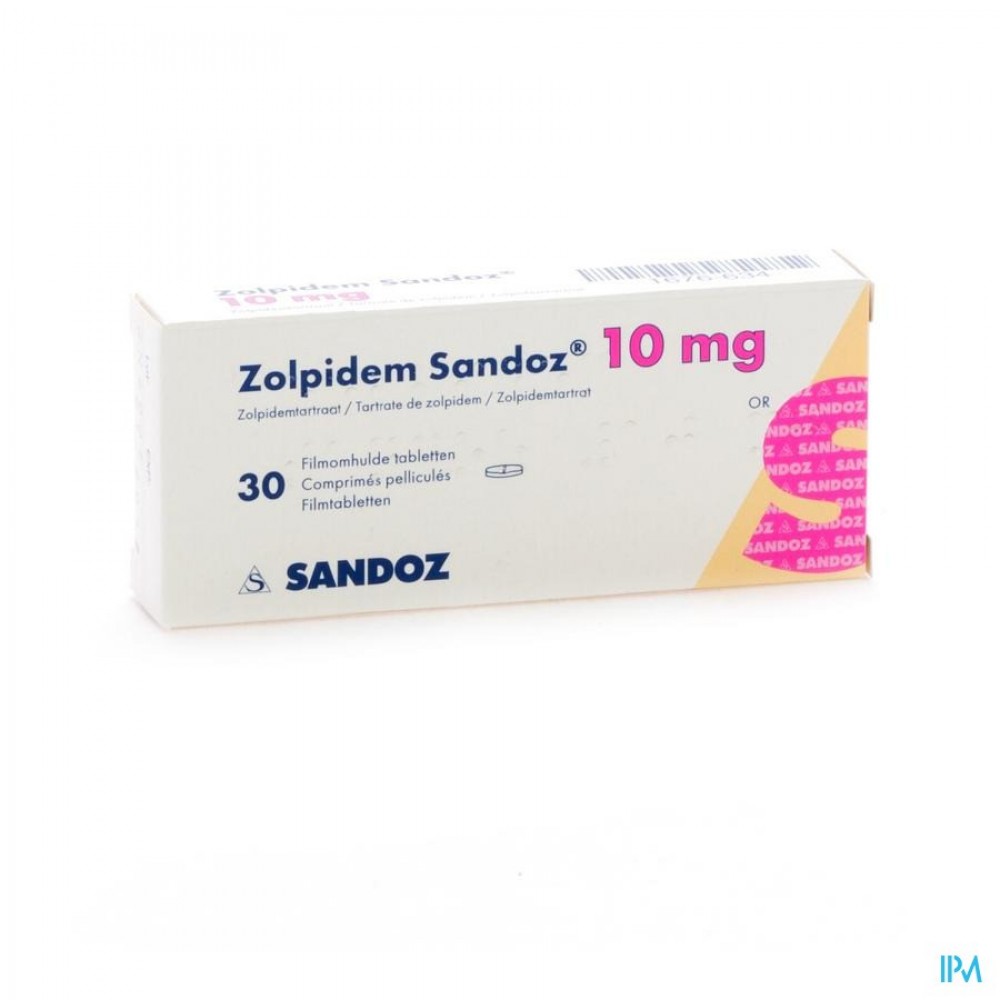Buy Zolpidem (Ambien)
$215.00 – $672.00
Zolpidem is a sedative-hypnotic medication used to treat insomnia. It works by slowing down the activity in the brain, allowing the user to fall asleep faster and stay asleep longer. Zolpidem is available in immediate-release and extended-release formulations and should only be used under the guidance of a healthcare professional.
Ambien is a sleeping pill – it became available in the United States in 1992 and then a controlled release Ambien and extended release Ambien became available at 2005. Now both of them are available a Generics Zolpidem – most commonly used sleeping pills in United States.
Ambien is in the sedative hypnotic family closely related to the benzodiazepines; all of them are schedule four drugs, which means they have low potential for abuse. When they first came on the market Zolpidem was thought to be only for people who have transient insomnia – insomnia lasting for less than fourteen days. With more experience, it was discovered that it was effective and the FDA gradually lifted the restrictions and then allowed up to two months, then up to a year and as of 2005 they said that you can use Ambien as long as it seems to provide benefit. It always had been said, at least initially, that it would wear out, that the effect would wear out – that is obviously false, that is not the case.
Ambien lasts for a long time, it improves sleep whether you have been taking it for a year, two or three – it all depends on what particular disorder you have.
If you have a sleep disorder – what do you do?
After you try everything else, you could consider cognitive behavior therapy or melatonin, sedating anti-histamine for sleep like Benadryl. Also sometimes people use anti-depressants for sleep like Doxepin or amitriptyline or special Trazadone – these are all prescription anti-depressants obviously.
Some people unfortunately are given prescriptions for atypical antipsychotics and anticonvulsants for sleep – those are potentially dangerous, especially because we have the so called-drugs, of which zolpidem is a prime example. Tens of millions of prescriptions are written every year for these drugs, six to ten percent of the population uses the sleeping pill. Four million people abuse the Ambien. It’s the most widely prescribed sleeping pill as we have mentioned. Sleeping problems increase in frequency, as people get older. Interestingly, sleep problems are quite as common in women as they are in men.
The dose of Ambien
In 2013 the FDA said – “hey, let’s change the dose for women, because they metabolize it slower than men, so let’s start with a lower dose of Ambien for women. 5mg Ambien, or 10mg Ambien.
So for some time it was a common rule – Ambien 5mg for women and Ambien 10mg for men. After a while if you are a woman and you find that you are not sleeping better – then you can increase it to 10mg Ambien. You can take it once at night, you do not get up in the middle of the night and especially you have to be cautious if you are elderly or debilitated or if you have significant liver disease.
Ambien should be taken immediately before sleep – it is a sleeping pill, obviously, you do not take it in the middle of the day and then drive to the grocery store. You would want to allow seven or eight hours of time before you have to awaken or before you have to do anything that is going to require coordination or mental equity. You want the drug to be basically metabolized and excreted before you have to do anything, other vice you may suffer from something else known as a “clouded brain syndrome”.
Clouded brain syndrome is when you have an impaired judgment and decreased reaction if you are driving a car.
What precipitated all of this is they found that eight hours after taking the drug, about fifteen percent of women, against three percent of men still had a significant elevation of the level of Zolpidem Ambien in their bloodstream, that is why it was suggested that we cut the dose a little bit.
The extended release ambien or controlled release ambien form – about sixty percent of the medicine is absorbed quite rapidly, so if we looked between five minutes and a couple of hours there is no difference between ambien immediate release and ambien controlled release. In Ambien controlled release the film coating tablet slowly dissolves over time and the other forty percent is slowly released into the system. The FDA says now that the initial dose of Ambien for women is Ambien 6,25mg and for we would prefer that same dose but they can take up to Ambien 12,5 mg.
The American Committee of Sleep Medicine however says that 6,25mg Ambien pill probably does no good – there will be slower absorption if you take it after a meal. If you are taking another central nervous system depressant – if you are taking alcohol, benzodiazepine, or opioid you have to be extra cautious so you should decrease either the dose of Ambien or of the other medicine that you are taking. We also know that about seventy percent of people who take Ambien pills continue to take them for more than a half a year. Forty percent unfortunately take them with another kind of central nervous system acting drug like opioid or benzodiazepine and that might increase the risk for toxicity.
Ambien is quickly absorbed within forty-five minutes to an hour; the elimination half-life is about two and a half hours. Lower clearance in women than it is in men, so the levels in women are about fifty percent as high as they are ae in men. The drug is converted into an inactive metabolite and excreted in urine.
Ambien for pregnant

There is probably an issue with pregnancy. Ambien crosses the placenta, so especially if you are taking Ambien in the third trimester the newborn might be born with respiratory depression and sedation. It does not cause birth defects. The problem with lactation also may be present because it enters the breast milk. Some people used to say – you should not breastfeed if you are taking the drug, but the concentration is so small that it does not appear to be an issue. It does appear to be an issue in children. It is not approved for people less than age eighteen, because they have a higher incidence of side effects, dizziness in about one out of every four people taking the drug and headache and hallucinations are extraordinarily common. If you are taking the drug, you want to make sure that you are taking it for the right reason. If you have a short-term insomnia after about seven to ten days – reevaluate, see if you really need the drug, see if you have some other kind of a co-morbid disease. Maybe you have arthritis – maybe you need to treat the arthritis and it is the arthritis pain that is keeping you awake. You may have an anxiety disorder insomnia and you need that appropriately treated.
You might want to be cautious, because certain people have a predisposition to either depression or suicidal thinking –we have to be cautious about the impaired alertness and all the motor coordination.
Caution for some people is because they may develop respiratory depression, especially if they have COPD or obstructive sleep apnea. Other problems from taking Ambien are drowsiness, dizziness and lack of coordination.
One of the common problems from taking Ambien may be when certain people wake up at night and they go to the bathroom no being fully coordinate, so they fall down and fracture a hip for instance. You have to be careful of that when taking the extended release Ambien, and you have to be careful the next day when you are driving a car obviously. There are cautions against taking the controlled release Ambien and driving the next day or engaging in potential hazardous activities or into activities where full mental alertness is required because we cannot really say for how long the medicine is going to stay in the system.
The impairments after taking Ambien can occur even if you are not aware of them.
What are the side effects of Ambien?
Side effects of Ambien are relatively uncommon outside of the drowsiness and the dizziness. Some people get a drugged feeling; some people can complain of blurred vision or double vision, some people can complain about diarrhea and nausea, muscle pains can occur as well.
Some children hallucinate on Ambien, especially if they take a higher dose. Obviously, Ambien is not for children.
Some people find that Ambien worsens depression, it worsens anxiety. Of course taking the drug would be a problem if you have obstructive sleep apnea or if you have COPD – this drug might not be appropriate.
Another side effect this medicine headlines is the amnesia that some people very rarely experience especially when taking a high dose and especially when they don’t go to bed after they take the pill and especially if they add the Ambien to either alcohol, opioids, tricyclic antidepressants or benzodiazepines. Some people develop abnormal complex behavioral activities so the drug was labeled as “with a caution” in two thousand seven for what are known as parasomnias. That means you sleepwalk or eat when you are supposedly asleep or carry on conversations or drive or have sex, go shopping, cook, eat and you are even not aware of it.
Those reports are sensational – they are usually on high dose and usually in women because of the higher concentration and they are usually in people who don’t go to sleep right away after taking the pill or if they have combined them with some other kinds of medicines.
There are relatively few interactions with benzodiazepines other than with central nervous system depressants. We have to be cautious for the impaired alertness if you are taking tricyclic antidepressant or a atypical antidepressant or an atypical antipsychotic. We know that the level of Ambien is going to be increased in your bloodstream if you are taking erythromycin or clarithromycin, if you take ketoconazole it is going to be decreased. In addition, the level of Ambien in your blood is going to be decreased if you take rifampin or St John’s wort. It is going to interact with Zoloft, and with Ambien so you do have to be careful – the issue of abuse and tolerance.
Ambien addiction
Addiction and withdrawal has received a lot of comment, but that is not really an issue – drug seems to be very safe. There is some Ambien rebound insomnia that people talk about – they say if you take a sleeping pill, you get addicted to a sleeping pill and then you need a sleeping pill.
No, if you have a problem sleeping then you need a sleeping pill because you have a problem sleeping and if you stopped taking a sleeping pill and you still have this problem then it did not cure the underlying problem. Therefore, you still have a problem sleeping and all of this stuff about rebound insomnia are highly overdrawn.
Could you overdose on Ambien?
If you take it by itself – you could and you are probably going to have a long sleep. You are not going to be in coma if this is the only drug you are taking.
The problem comes in when people take Ambien or overdose on Ambien and they also have the alcohol or the opioids or another central acting drugs that had to depress the central nervous system. Then potentially we have somnolent, some people go into coma, some people have a cardiovascular or respiratory compromise and some people actually die if they go and abuse Ambien in combination with another drug.
How Ambien works
Ambien works with the receptor in the brain that is called the GABA receptor. There is many GABA receptors in the brain and it specifically works with the GABA one alpha e receptor, and because it works only in that receptor it does not work as a muscle relaxant – those are the Alpha 2 Alpha 3 and Alpha 5 receptors. Benzodiazepines – drugs like Lorazepam, Xanax or Valium work on all of the GABA receptors – they do not care, that is why in the long run you have more problems potentially.
With Ambien there is no activity on the dopamine site or the serotonin site, it does not work as an anti-histamine or anticholinergic. It does not interfere with sleep architecture. At most, it might actually increase the deep sleep from Ambien. The stage three and four – the slow wave sleep seems to have inconsistent results on the RAM sleep – it does not seem to decrease the RAM sleep. It will shorten the sleep latency – the time it takes to fall asleep on Ambien is shorter by about twenty minutes over that of the placebo. It is going to decrease the number of awakenings after you go to sleep, it will decrease what we call the “wake time after sleep onset”. The times you wake up in the night – you are going to wake about twenty-five percent less that on the placebo. It will increase the total sleep time by about thirty minutes on average. The sleep efficiency on Ambien is going to be increased as well. We can define insomnia as transient or chronic, but more importantly we can classify it as some people can not fall asleep, about thirty five to fifty or sixty percent of the people find the fact that they can not fall asleep need the sleeping pill the major problem. Other people have problem with sleep maintenance – they can go to sleep ok, they just can not stay asleep. It is fifty to sixty percent of people – that is the most prevalent sleep disorder.
We have also people with a non-restorative sleep disorder – they can fall asleep but they are still tired when they wake up. The problems often coexist, that is why numbers are about 100%. If you have a problem with sleep onset – the immediate release Zolpidem or immediate release Ambien is ok, it is a good pill.
On the other hand if your problem is sleep maintenance – remember – the drug half-life is only two and a half hours, so not a lot of people are going to be able to sleep through the night with the immediate release Ambien, you might need the controlled release Ambien or controlled release Zolpidem.
Right now, in the United States, about twenty-five to thirty percent of prescription for Ambien are written for the immediate release Zolpidem and sixty or seventy percent are written for the controlled release Zolpidem or the controlled release Ambien.
If the controlled release Ambien is not enough to keep you asleep throughout the night then there are other options.
You can go to Lunesta – Lunesta is also considered as z-sleeping pill or you can go to the Restorill – that is in the benzodiazepine family.
The “z” means that they are related to but they are not the same as benzodiazepines. Zolpidem sleeping pill is obviously one of the “z-s” – the half-life is two and a half hours.
The Zaleplon or Sonata is the effective short acting sleeping pill – that only lasts for about an hour.
There is also a Zopiclone Imovane – it is a long lasting sleeping pill – its half-life is six hours – six hours will get you through the night.
Forms of Zolpidem
They have other forms of Zolpidem that are available – they have Zolpidem mouth spray – you can put Zolpidem under your tongue. That gets a little fancy and unnecessary for the overwhelming majority of people. Most people find that their sleep disorders are chronic and when they are chronic – we have to look for the underlying reasons. You can say you have some pre-disposing factors to sleep disorders. Some people have a family history, some people have a life long history of poor sleep and some relate it to stress. There are also precipitating factors, if you have predisposing factors – that does not mean you have insomnia – that simply means you are more likely to develop insomnia. Precipitating factors could be environmental, could be medical – it can be a baby screaming on the background, noise in the next room or people banging on the celling. You could have lost sleep because of the psychological stress – you could have been fighting with your spouse.
Then we have the perpetuating factors – if we just had the predisposing factors and the precipitating factors, the insomnia would go away when the vent resolved.
Unfortunately, lots of people notice that when they developed insomnia – they have developed many bad habits connected to it. Behavioral factors, other factors that lead to a vicious cycle.
Chronic insomnia needs to be addressed, because in chronic insomnia if you do not sleep well –that could lead to mood disorders and alcohol dependence and the anxiety and depression. It can lead to the chronic pain, to the cardiovascular disease, hypertension and motor vehicle actions and problems with coordination are possible as well. Therefore, on needs to treat insomnia appropriately and saying that I do not want a sleeping pill because it might be habit forming is not the appropriate way to go.
How do we define insomnia?
Insomnia is a subjective problem for the most. We can say that if you go to bed, you cannot fall asleep for at least thirty minutes, or if given enough time, you still cannot sleep for three and a half or four and a half hours. You wake up in the middle of the night a bunch of times. If you wake up early in the morning and you cannot go back to sleep – you have a non-restorative sleep – that I insomnia.
Now we know that a lot of people have insomnia – they think that is a sleep problem, but that is a pathophysiology problem. It is a problem with hyperarousal – it is just the way your brain is hard wired. We find hyperarousal not only during the sleep but also during wakefulness; we find that people who are suffering from sleep disorders have elevated level of cortisol. Those people have changes in the heart rhythm variability, and if we take a look at the electroencephalogram – it is different from the people that have normal sleep.
What is the cheap price for Zolpidem?
The good news about Ambien is that it seems to work fairly well and also it is now relatively inexpensive Zolpidem. Especially there is a lot of inexpensive Generic Zolpidem on the market.
You can buy Zolpidem with cash price for about $25 a month with a coupon it may be $9 to $25 a month.
The name brand pill Ambien the cash price for original brand zolpidem is about $600.
When we look at Ambien – it is a good sleeping pill, it helps you to fall asleep, but does it really help you to stay asleep?
People consider sleeping pills pariahs, but if you don’t sleep – then you have a problem with a daytime productivity and the increase in the incidence of the heart disease, irritability and memory problems, weight gain, motor vehicle accidents incidence, so consider a proper therapy if you suffer from insomnia.
Medically reviewed by Dr Jonathan I Martin

| Dosage | 10 mg |
|---|---|
| Quantity | 30 pills, 60 pills, 90 pills, 120 pills |
13 reviews for Buy Zolpidem (Ambien)
Add a review Cancel reply
Related products
Sleep Aid



Ricardo –
One of the best online shops I’ve ever visited.
Erwin –
Very positive result after using this product.
Kaley –
Been using a lot of items, this one is obviously the best
Elsa –
It’s far better than those similar products, while the price is still acceptable.
Reid –
Great pharmacy. The product arrived on time and I am very pleased with the quality.
Chaz –
I have no words to explain my satisfaction after using this product.
Alice –
Great customer service, really helpful and friendly attitude.
Lenore –
The service I got from this pharmacy was impressive. The product I ordered was exactly what I wanted.
Oren –
I’m super glad about my purchase.
Cora –
Amazingly satisfied with the purchase.
Oswaldo –
Highly recommend this pharmacy – great online experience with fast delivery and top quality product.
Unique –
The customer service is very comprehensive and polite. Quality is impressive.
Austen –
Highly recommend this product. The customer service is exceptional.